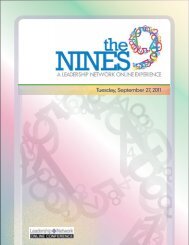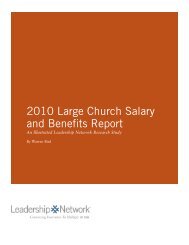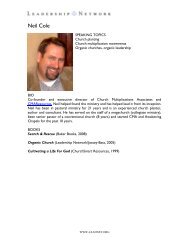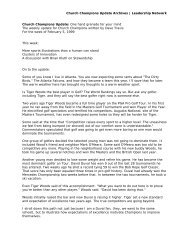ARE WE A PEOPLE AT HALF TIME? - Leadership Network
ARE WE A PEOPLE AT HALF TIME? - Leadership Network
ARE WE A PEOPLE AT HALF TIME? - Leadership Network
You also want an ePaper? Increase the reach of your titles
YUMPU automatically turns print PDFs into web optimized ePapers that Google loves.
I<br />
n the previous issue of NEXT, we<br />
asked about a<br />
the use of consultants in<br />
local congregations. Here e is whaw<br />
hat t youy<br />
said:<br />
The top ten purposes for using a consultant were<br />
(in descending order):<br />
1. Architect/Engineer/Land Planning and Capital-campaign-forbuilding-program<br />
tie;<br />
2. Ministry assessment/evaluation;<br />
3. Long range planning;<br />
4. Organizational change;<br />
5. Staffing/personnel matters;<br />
6. Stewardship development;<br />
7. Community analysis;<br />
8. Worship and Music options;<br />
9. Marketing;<br />
10. Communications<br />
In addition to the qualifications of the consultant,<br />
the following were the most influential reasons in<br />
selecting a consultant (in descending order):<br />
1. Recommendation by another church;<br />
2. Recommendation by another pastor;<br />
3. Church had previously used this consultant;<br />
4. Recommendation by another consultant;<br />
5. Recommendation by a church member.<br />
Important “learnings” from the use of consultants<br />
that might be useful to other churches included:<br />
☛ Clearly define in writing the appropriate boundaries of the<br />
church’s culture, the scope of services to be rendered, and<br />
expectations before engaging the consultant.<br />
☛ Personally visit and interview other clients of the consultant<br />
before making a final decision on the selection.<br />
☛ Do the proper advance work ...prepare core leaders, obtain<br />
relevant information, and develop a realistic assessment of your<br />
needs. Identify any organizational contradictions. Get the facts<br />
and expose false assumptions.<br />
☛ Discover whether the consultant is interested in the church’s<br />
ministry growing or fitting you into their “plan.” Do not accept<br />
generalizations or revisions of a previous plan.<br />
☛ Look for the “big picture” perspective and one that leads to<br />
ownership by the congregation.<br />
7







